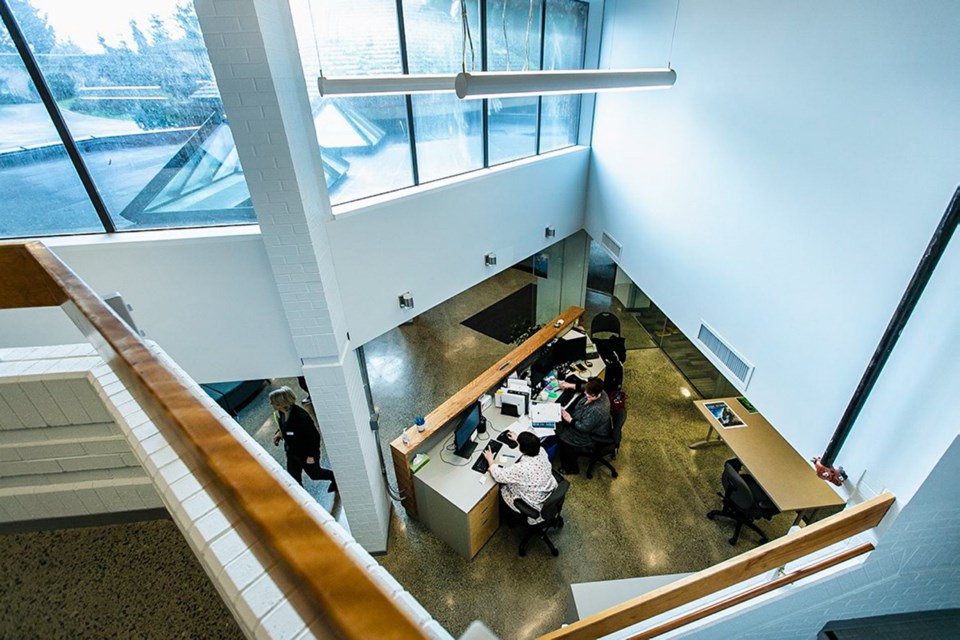Internationally known Ocean Networks Canada, based at the University of Victoria, has settled into a refurbished building at the six-hectare Queenswood property on Arbutus Road.
ONC operates two underwater cable systems off Vancouver Island and others in the Arctic and Atlantic that collect an array of long-term continuous data, including information on seismic activity.
At the building’s official opening Thursday, federal Fisheries Minister Jonathan Wilkinson committed $12.6 million over the next four years to allow ONC to pursue projects such as monitoring factors that affect endangered southern resident killer whales. Researchers put their population at 74.
Wilkinson said that gaining a better sense of how noise is affecting the whales is a priority.
“An effective strategy to save the whales is urgent. There aren’t that many of the whales left, and as we know from reports just a couple of weeks ago there are some that are not in great health, largely because they’re not feeding enough.”
The newly revamped site, known as the Ocean-Climate Building, is a former residential-care facility operated by the Sisters of St. Ann before they sold the Queenswood land to UVic in 2010.
The building’s conversion to a research and technology centre cost $9.5 million.
Funding for the project included $5.15 million from UVic, $3.5 million from the federal government and $850,000 from the province.
“It’s going to be a world-leading centre for research that’s going to help us to better manage human activity going forward, related to both climate change and also to marine issues,” Wilkinson said.
More than 200 people work in the 30,000-square-foot building, which is within two kilometres from UVic’s main campus.
“The Queenswood campus will serve as a gathering place for partnerships on a local and global scale,” said David Castle, UVic vice-president research.
“It is partnerships that will move us forward as we work to tackle the great challenges of our time, in how we address climate change, protecting species at risk and ensuring our oceans and pristine coastal communities are protected for our children, grandchildren and beyond.”
UVic president Jamie Cassels said the federal funding that has come to ONC is an investment in the future.
“The work that’s done in this building is globally connected,” he added. “It networks with researchers and partners around the world.”
In announcing the $12.6-million contribution, Wilkinson said the collection and analysis of data is crucial to understanding the ocean environment, including links between changes to the ocean and climate change. He said the funding will let ONC “continue its valuable ocean-monitoring work in the waters off British Columbia.”
“This funding will build on ONC’s ocean-noise monitoring program and expand its monitoring of sea-surface currents in Pacific waters,” Wilkinson said.
“Collectively, these types of measurements will help scientists better understand some things about how the ocean works, the changes that are occurring and why those changes are taking place.”
ONC was given $7.2 million in federal funding last year, which also went to researching underwater noise, as well as ocean currents.
ONC president and CEO Kate Moran said the Ocean-Climate Building brings together many scientific disciplines “and where disciplines interact, innovation explodes.”
One example of that is the development of Canada’s first earthquake early-warning system, she said, which brought together physicists, seismologists, social scientists and engineers.
“It will be the best in the world.”
Moran said there is still a lot to learn about the ocean environment.
“You have to understand that everything physical that happens on land also happens in the ocean,” she said. “We also want to understand life, we don’t understand life in the ocean very well yet.”
Moran said the state of the ocean is an important indicator of the overall health of the planet. Canada’s oceans present researchers with plenty of opportunities, she said.
“The ocean off the coast of Canada, including the Arctic, comprises some of the richest and most diverse ecosystems on Earth.”



